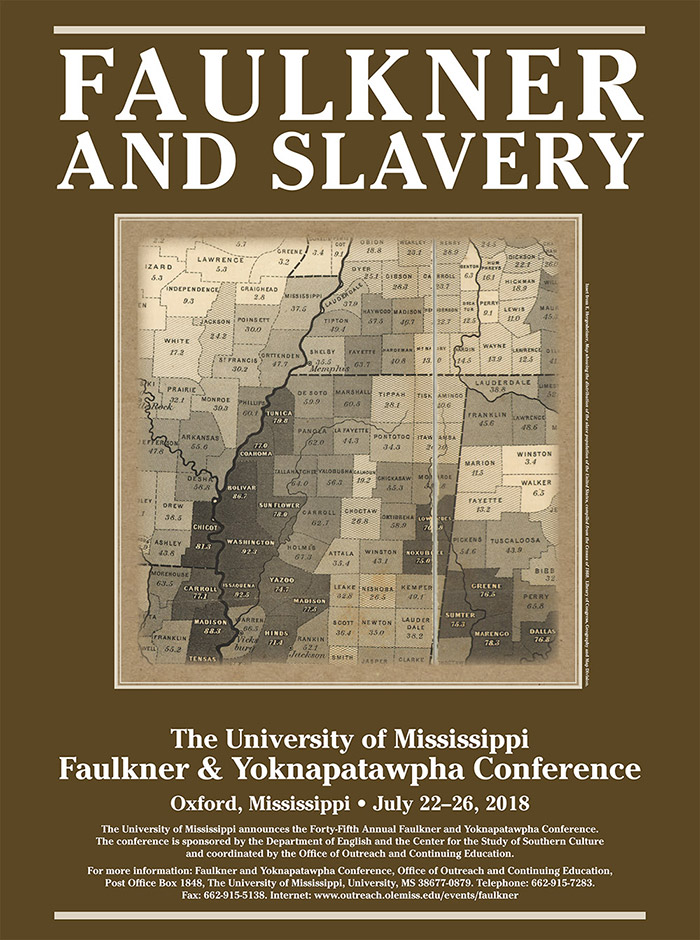
Panel. Planters, Plantations, Plaçage
Location
Yerby Auditorium
Start Date
25-7-2018 11:00 AM
Description
- A Design for Narrative: William Faulkner, Drew Gilpin Faust, and the Tragedy of the Slaveholding South / Sarah E. Gardner, Mercer University
Drew Gilpin Faust’s biography of South Carolina slaveholder James Henry Hammond bears William Faulkner’s heavy imprint. Subtitled “A Design for Mastery,” Faust’s study signals early to readers the debt it owes to Faulkner’s most celebrated work, Absalom, Absalom! This paper examines the ways in which these two authors understood and narrated the tragedy of the slaveholding South. I am particularly interested in how Faulkner, the writer, and Faust, the historian, unfolded their stories. How did they exert authorial control over the stories they told, for example? Who becomes implicated in their narratives, and who sits in judgment? - “There was a place called the West Indies to which poor men went in ships and became rich”: Faulkner’s description of sugar slavery in the West Indies: a critical component in the evolution of Thomas Sutpen’s design / Murphy Wood, Point University
Why Faulkner chose to have the main character in Absalom, Absalom!, Thomas Sutpen, travel to Haiti to get rich quick and experience the terror of a slave revolt illustrates his knowledge of the unique form of slavery that developed in the sugar producing islands of the Caribbean. The frequency and ferocity of slave revolts in the Caribbean, especially Haiti, led the outnumbered sugar planters to resort to fierce, arbitrary and instantaneous violence to intimidate and control their slaves. This presentation will show how Thomas Sutpen learned from his experience in Haiti and sought to control his slaves at Sutpen’s Hundred on a Caribbean model. It will also explore sex and race relations between planters and slaves in the Caribbean in order to contextualize Thomas Sutpen’s relationship between Eulalia Bon Sutpen and their son Charles Bon. - Louisa Picquet and the Literary Octoroon / Jennie Lightweis-Goff, University of Mississippi
Relational Format
Conference proceeding
Recommended Citation
Gardner, Sarah E.; Wood, Murphy; and Lightweis-Goff, Jennie, "Panel. Planters, Plantations, Plaçage" (2018). Faulkner and Yoknapatawpha Conference. 24.
https://egrove.olemiss.edu/fy/2018/schedule/24
COinS
Jul 25th, 11:00 AM
Panel. Planters, Plantations, Plaçage
Yerby Auditorium
- A Design for Narrative: William Faulkner, Drew Gilpin Faust, and the Tragedy of the Slaveholding South / Sarah E. Gardner, Mercer University
Drew Gilpin Faust’s biography of South Carolina slaveholder James Henry Hammond bears William Faulkner’s heavy imprint. Subtitled “A Design for Mastery,” Faust’s study signals early to readers the debt it owes to Faulkner’s most celebrated work, Absalom, Absalom! This paper examines the ways in which these two authors understood and narrated the tragedy of the slaveholding South. I am particularly interested in how Faulkner, the writer, and Faust, the historian, unfolded their stories. How did they exert authorial control over the stories they told, for example? Who becomes implicated in their narratives, and who sits in judgment? - “There was a place called the West Indies to which poor men went in ships and became rich”: Faulkner’s description of sugar slavery in the West Indies: a critical component in the evolution of Thomas Sutpen’s design / Murphy Wood, Point University
Why Faulkner chose to have the main character in Absalom, Absalom!, Thomas Sutpen, travel to Haiti to get rich quick and experience the terror of a slave revolt illustrates his knowledge of the unique form of slavery that developed in the sugar producing islands of the Caribbean. The frequency and ferocity of slave revolts in the Caribbean, especially Haiti, led the outnumbered sugar planters to resort to fierce, arbitrary and instantaneous violence to intimidate and control their slaves. This presentation will show how Thomas Sutpen learned from his experience in Haiti and sought to control his slaves at Sutpen’s Hundred on a Caribbean model. It will also explore sex and race relations between planters and slaves in the Caribbean in order to contextualize Thomas Sutpen’s relationship between Eulalia Bon Sutpen and their son Charles Bon. - Louisa Picquet and the Literary Octoroon / Jennie Lightweis-Goff, University of Mississippi

